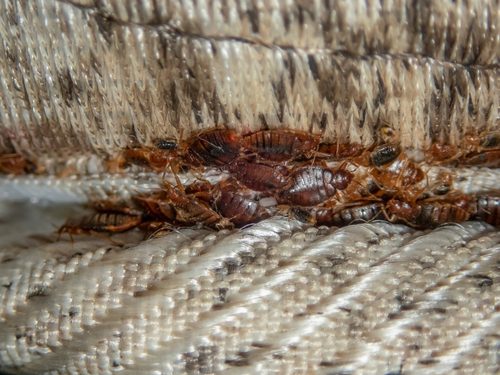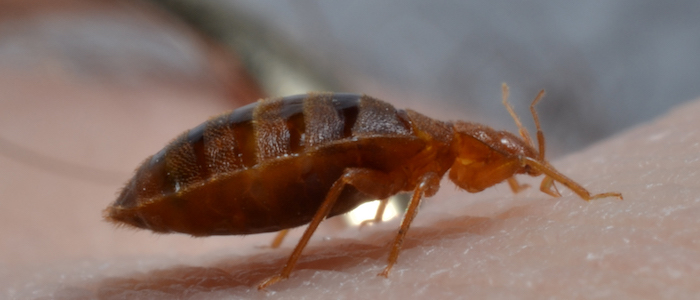How Did My Business Get Bed Bugs?
Since their explosive re-emergence in the 1990s, bed bugs have become a significant problem pest throughout the U.S. for both homes and businesses. These bloodsucking insects spread by hitchhiking on unsuspecting travelers. This means bed bugs frequently infest:
- Hospitality – hotels, resorts, Airbnb properties
- Multi-housing – apartment complexes, rental properties, condos
- Educational – schools, colleges, dorms, military
- Medical facilities – hospitals, clinics, nursing homes
Bed bugs are particularly troublesome for businesses. A bed bug infestation could ruin your reputation, subject you to fines or even shut you down! Bed bug infestations are almost impossible to remove without professional help because bed bugs constantly lay nearly-microscopic eggs. If your business has a bed bug infestation, give Gregory Pest Solutions a call today. We help businesses of all kinds and sizes quickly and safely eliminate their pest problems.
How to Know If You Have Bed Bugs
There are two steps to Gregory’s smarter commercial bed bug control: identification and elimination. Both steps are crucial because if we don’t find and wipe out every single bed bug, the infestation will recur. Luckily, Gregory has developed Smarter Solutions for both bed bug identification and elimination. Here’s how our process works:
Step One: Bed bug-sniffing Dog Identification

Gregory specially trains dogs to sniff out bed bugs in commercial buildings. Even if you know how to identify bed bugs, these dogs specialize in locating every bed bug in large target areas. We use bed bug-sniffing dogs to search apartments, hotels and even warehouses for infestations. Dogs are highly-effective because they can sniff out bed bug eggs and larvae along with adult insects.
Our canine bed bug units will scour your business to find every affected location so that you don’t risk a return infestation. After our canine inspection, we’ll know where to focus our heat treatment for bed bugs.
Step Two: Thermal Remediation® Heat Treatment
Thermal Remediation heat treatments are the most effective, least intrusive and most environmentally-friendly way to kill bed bugs.
Gregory’s experts subject each of the areas identified in step one with concentrated heat treatments of 120° F or higher. Treatment continues for four hours until the heat has killed all bed bug adults, larvae, and eggs. Our team may also apply residual pesticides to nooks and crannies where the heat may not reach completely to ensure we get every bed bug. After treatment, we conduct a final inspection to make sure we’ve fully eliminated the infestation.
Together, these techniques allow us to treat entire facilities effectively and unobtrusively, so that you can return to business as usual. Gregory has eliminated bed bug infestations from schools, hotels, assisted living facilities, and more.
Thermal Remediation® and related logo is a trademark owned by TEMP-AIR, Inc. and is used by permission.
Don’t Let Bed Bugs Slow Your Business
The longer you wait to deal with a bed bug infestation, the more entrenched and spread out bed bugs become. As soon as you suspect your business has bed bugs, call Gregory Pest Solutions. We’re committed to complete bed bug remediation so that you, your staff and your customers remain safe and healthy. Call Gregory today!
Commercial Bed Bug FAQ
How does commercial bed bug control differ from residential bed bug control?
Controlling bed bugs in a business setting requires discretion, urgency and efficiency so that it doesn’t interrupt regular operations. It means conducting treatments on a larger scale, following strict compliance measures and following up with preventative measures in high-traffic areas at a greater frequency.
What are the signs that my business needs commercial bed bug control?
Teaching your staff to recognize the signs of a bed bug infestation is key to minimizing the disruption they can cause. You want to notice them before your customers do. Rust colored stains, skin sheddings or musty odors are sure signs that bed bugs have infiltrated your business.
How long does commercial bed bug control take?
The biggest concern is determining which areas have been affected by the bugs. Once identified, these areas can be segmented and treated with the heat and pesticide treatments outlined above. These treatments require the better part of a day to be fully effective. We recommend regular follow up to insure against resurgence.
Is commercial bed bug treatment safe for my customers and employees?
Absolutely. Your safety is always our top concern. Heat treatments are among the safest ways to dispose of unwanted pests and the pesticide treatments we use are all FDA approved. Your technician can answer any questions you have about the tactics they use to ensure your business is clear of bed bugs.
How can I prevent future bed bug infestations in my commercial property?
Because bed bugs are brought in by people and luggage, there is no single way to prevent them. Your best defense is education. Make sure that your staff knows what bed bugs look like and the signs to watch for. Regular, dedicated cleaning helps to remove bugs, eggs and larvae before they can take root and become a bigger issue.
Why choose Gregory Pest Solutions for commercial bed bug removal?
As a family owned business that began in 1972, we’ve seen plenty of changes in the pest control industry. Over the years, we’ve embraced the most effective pest control solutions and learned how to keep pests like bed bugs from coming back. You can trust our experience and tactics to quickly eliminate your bed bug problem so you can return to business as usual.

